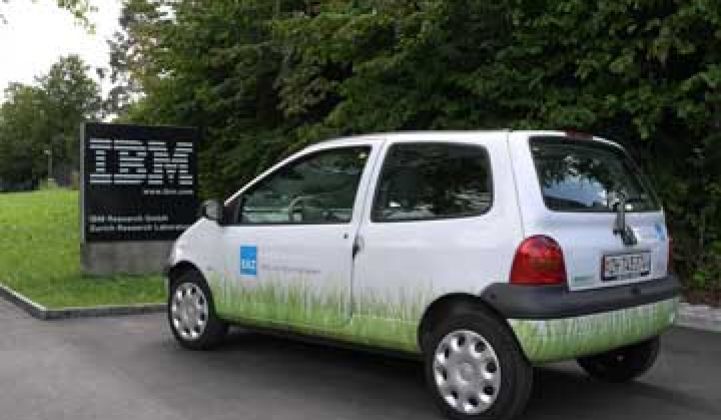Nissan is squarely focused on fast charging for electric vehicles. Recent reports have found that researchers at Kansai University in Japan are working on a solution to charge the Leaf’s battery in just 10 minutes by tweaking the capacitor. The technology, however, is likely about a decade away from commercialization -- but Nissan is firing on all cylinders.
On Thursday the carmaker announced it would work with DBT, Europe’s largest charging station manufacturer, to make cheaper, smaller DC fast chargers. The new chargers would be able to fuel up a Nissan Leaf in less than 30 minutes and cost less than $15,000. Unlike the 10-minute technology being pioneered at Kansai University, the DBT units will be available in early 2012.
DBT is just one of a handful of charging companies working with Nissan to speed the development of fast charging. Even just a year ago, fast charging seemed as though it might be far into the future. However, companies like Walgreens are embracing DC charging at its public stations wherever possible (there are some limitations based on the location and utility it is working with). DBT is also setting up shop in the U.S. and is currently scouting locations for a U.S.-based manufacturing facility.
For more on the latest developments in the electric vehicle industry, join Greentech Media on October 20 for The Networked EV in San Francisco.
In other news:
-- As part of its Smarter Planet platform, IBM is involved with various utilities and charging companies to network cars back to the charging systems. The global giant’s most recent project is a pilot in Zurich with the utility EKZ that uses a data-recording device to collect information about the charge level, location and power source. The device, which is about the size of a phonebook, then sends the information back to the cloud via a cellular network. From there, it can then go back to the utility, as well as the car owner’s smartphone or web browser.
The IBM app shows the vehicle’s battery level, how much range is left, the vehicle location, charge schedule and cost of energy in real time. The app allows drivers to plan to have their car charge when prices or low, or turn the charging over to the utility while ensuring that it is topped up by the time the driver needs it. EKZ is using the technology to charge the cars when solar panels are producing electricity, and adjusting the charging when the panels are not in use.
In many ways, this is very similar to the offerings from other charging networks and EV carmakers. But IBM asserts that this goes a step further by providing real-time energy information to the driver (EV pricing tariffs are still being worked out by most utilities in the U.S.), adding that that EKZ also has visibility into what the EVs in its territory are doing in real time.
-- It’s official: EV charging stations are not utilities, at least not in California. If that seems like old news, it is in some ways. In May 2010, the California Public Utility Commission concluded: "The ownership or operation of a facility that sells electricity at retail to the public for use only as a motor vehicle fuel and the selling of electricity at retail from that facility to the public for use only as a motor vehicle fuel does not make the corporation or person a public utility within the meaning of Pub. Util. Code 216 solely because of that sale, ownership or operation."
Now, it is law. California governor Jerry Brown signed AB 631, which makes the decision by the CPUC official. Charging companies such as Coulomb Technologies heralded the announcement.



